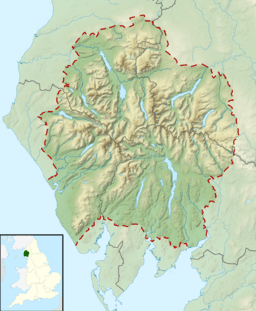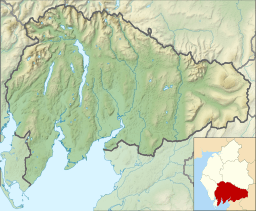Blelham Tarn facts for kids
Quick facts for kids Blelham Tarn |
|
|---|---|
| Location | Cumbria |
| Coordinates | 54°23′44″N 2°58′41″W / 54.39556°N 2.97806°W |
| Type | natural |
| Etymology | dark blue pool |
| Primary outflows | Blelham Beck |
| Max. length | 0.66 km (0.41 mi) |
| Max. width | 0.257 km (0.160 mi) |
| Surface area | 11 ha (27 acres) |
| Average depth | 6.8 m (22 ft) |
| Max. depth | 14.5 m (48 ft) |
| Water volume | 717,829 cubic metres (582 acre⋅ft) |
| Residence time | 50 days |
| Surface elevation | 47 m (154 ft) |
Blelham Tarn is a large lake in the Lake District of England. It is located north of a hill called Latterbarrow. The small villages of Outgate, Low Wray, and High Wray are very close by.
The tarn gets its water from streams and drains to the northeast. Its water flows out through a short stream called Blelham Beck into Windermere. This stream was once made straighter and deeper by people.
Wildlife in Blelham Tarn
Blelham Tarn is home to many different kinds of fish. You can find brown trout, eels, perch, pike, and roach here.
Much of the tarn's edge is covered in tall reeds. Many types of waterfowl also live here. These include the great crested grebe, whooper swan, and golden-eye.
Protecting the Tarn
Scientists regularly check on Blelham Tarn. It is part of a network that watches lakes in the United Kingdom. The tarn is known as eutrophic, which means it has a lot of nutrients. These nutrients can sometimes cause too much plant growth, like algae.
The tarn has had problems with water pollution from nearby farms. This pollution has led to large amounts of blue-green algae growing in the summer.
Blelham Tarn and its nearby bog cover a total area of 49 hectares. This area is very important for nature. It is officially named a Site of Special Scientific Interest (SSSI). The bog area is also a National Nature Reserve.
Plants and Insects of the Bog
The bog is a special wetland area. It has many unique plants, such as:
- Sphagnum moss
- Bog myrtle
- Cotton-grass
- White-beaked sedge
Rare insects also live in the bog. These include special kinds of caddis-flies and a tiny snail called vertigo lilljeborgi.
 | Emma Amos |
 | Edward Mitchell Bannister |
 | Larry D. Alexander |
 | Ernie Barnes |



